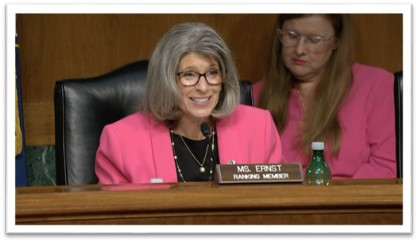Ernst Works to Support Female Entrepreneurs in Iowa, Across the Country
WASHINGTON – U.S. Senator Joni Ernst (R-Iowa), Ranking Member of the Senate Small Business Committee, spoke about her work to expand pathways to women’s entrepreneurship at today’s hearing.
Ernst highlighted her effort to improve access to childcare in rural communities, boost mentorship opportunities for female entrepreneurs, and eliminate fraud in the Women-Owned Small Business contracting program. She also advocated for the consistent allocation of resources in the Small Business Administration’s Women’s Business Center program, noting that Iowa only has one center to service the entire state.
Click here or the image above to watch.
Ernst’s full remarks:
“Good morning. Thank you, Mr. Chair and thank you to all of our guests here today. I walked into the room and I was incredibly impressed by having so many wonderful, strong women entrepreneurs here. Thank you for joining us.
“I also want to welcome the Association of Women’s Business Centers, and thank you for the work you are doing. It’s incredibly important that you’re out there supporting women all across our great United States. And a special shout out to TJ Daniels of the Iowa Women’s Business Center, who is here today.
“Today, we will examine ways to help women-owned small businesses succeed. There are more than 12 million women small business owners contributing $2.1 trillion in total sales to our national economy. While women entrepreneurs are creating jobs and igniting local economies, according to the National Federation of Independent Business, the Small Business Optimism Index remains below the 49-year average for the 18thconsecutive month. Inflation and rising interest rates are the top concerns.
“Unfortunately, small businesses continue to suffer under Bidenomics. Despite the White House attempting to paint an optimistic view of the economy, small business owners are not buying the narrative.
“President Biden has issued nearly $360 billion in new regulatory costs on our small businesses. Rather than focusing their time and energy on strengthening and growing their small businesses, many have to spend time figuring out how to comply with burdensome government regulations. In an effort to address this, I’m working on the PROVE It Act, to ensure sure small businesses have a voice in federal agencies’ rulemaking process.
“Another challenge I hear from businesses and families is the lack of access to affordable, quality child care options. In Iowa, 53,000 women have left the workforce since 2020 due to lack of child care options. While our legislature and Republican Governor, Kim Reynolds, have made progress, there’s much more work to be done, specifically at the federal level.
“That’s why I’m proud to say my bipartisan Small Business Child Care Investment Act with Senator Rosen passed out of our Committee just last week. The bill allows non-profit child care providers, including religious non-profits, to access SBA loans. This legislation will create a greater number of affordable child care options, especially in rural areas like mine, and I will continue to advocate for this bill to be signed into law.
“Furthermore, accessing quality business training and coaching is critical to our women small business owners. By modernizing the Small Business Administration’s SCORE program, we will be giving entrepreneurs, especially our women entrepreneurs, access to quality mentorship.
“My SCORE Act of 2023, which revitalizes SBA’s mentorship program by adding a team of women business leaders, called the National Women’s Business Coaches, will work alongside SCORE coaches and pair them with aspiring and existing entrepreneurs. These coaches will work to recruit individuals with expertise across all job industries to join the SCORE program. This will help guarantee our young entrepreneurs receive the relevant and productive assistance to support their path to success.
“Lastly, I want to highlight a critical bill I introduced to close loopholes that enable fraud in the Women-Owned Small Business contracting program. The Accountability in Women-Owned Small Business Contracting Act eliminates self-certification in the program and holds federal agencies to task by forcing department and agency heads to testify before Congress when they fail to meet their own women-owned small business contracting goals.
“Since much of the discussion today will focus on the SBA’s Women’s Business Center program, I’m thankful we’re able to focus on this, but I want to be very clear about my priorities as we consider any potential reauthorization of this program.
“The distribution of program resources must be made more consistent across all states, especially in our rural areas. Mr. Chairman, I do commend you for having four Women’s Business Centers in Maryland, but I’m sure you can understand my frustration that In Iowa, we only have one.
“Many of my colleagues on the Republican side share my frustration that as the Administration has added additional Women’s Business Centers to the program, they haven’t seen the benefits in their own states, many of which, like mine, only have one center to service the entire state.
“The placement of new Centers and the allocation of taxpayer dollars by the SBA must be distributed broadly in the future. Again, I want to thank all of you for being here today, and I look forward to the discussion on how we can best serve our women entrepreneurs.”
###

